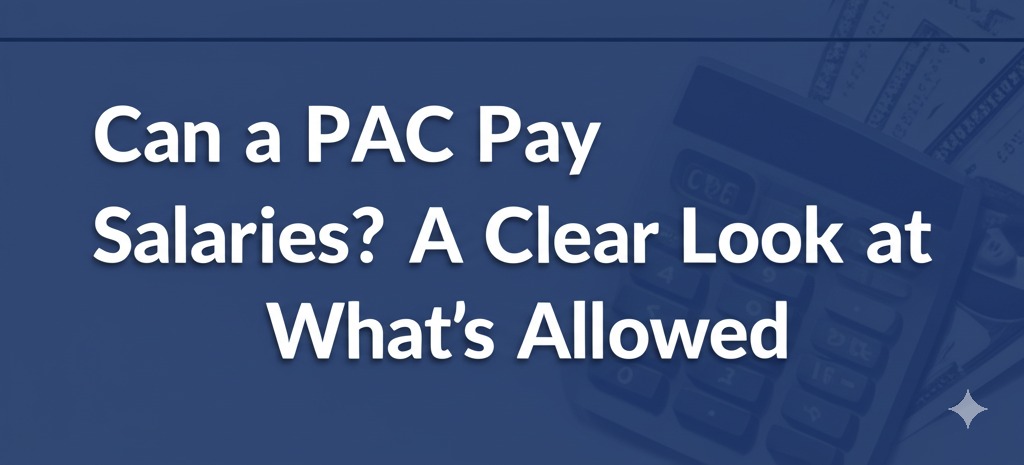
Political Action Committees (PACs) play a powerful role in U.S. politics, funneling millions of dollars into campaigns, causes, and advocacy. But can a PAC pay salaries? And if so, to whom and under what rules?
If you’re wondering how PACs operate behind the scenes and whether they can use their funds to pay individuals, you’re not alone. Whether you’re a political enthusiast, a campaign worker, or just curious about election financing, this guide breaks it down for you.
What Is a PAC?
Before we dive into salaries, it’s important to understand what a PAC actually is.
PACs, or Political Action Committees, are organizations formed to raise and spend money to elect or defeat political candidates. They are heavily regulated by the Federal Election Commission (FEC), and their financial activities must follow strict guidelines.
There are different types of PACs, including:
- Connected PACs – Tied to a corporation, union, or trade group
- Non-connected PACs – Operate independently of a business or labor organization
- Super PACs – Can raise unlimited funds but cannot coordinate directly with candidates
Each type has slightly different rules, but they all operate within the framework of federal campaign finance laws.
Can a PAC Pay Salaries?
Yes, a PAC can pay salaries—but there are important restrictions.
The Federal Election Commission (FEC) allows PACs to use funds to pay reasonable salaries to staff who work for the PAC. This is considered a legitimate operating expense. However, the details matter.
What Counts as a “Reasonable” Salary?
The FEC mandates that any salaries paid from PAC funds must be:
- Directly related to the PAC’s activities
- Proportional to the work done
- Not excessive or outside market norms
In short, PACs can’t be used as personal piggy banks. If someone is being paid, they must be actively working to advance the PAC’s mission, and their compensation must align with standard rates for similar work.
Who Can a PAC Pay?
PACs can legally pay salaries to the following individuals:
1. Full-Time or Part-Time Employees
If someone works directly for the PAC—handling strategy, administration, outreach, or compliance—they can be paid for their time.
2. Campaign Staff (With Conditions)
PACs can support campaigns, but they must be careful. If a PAC pays someone working for a campaign, it may be seen as in-kind coordination, which is restricted—especially for Super PACs.
PACs that are not allowed to coordinate with campaigns (like Super PACs) cannot pay salaries for people doing direct campaign work.
3. Consultants and Vendors
A PAC can also pay outside professionals or firms for:
- Legal services
- Advertising
- Public relations
- Compliance assistance
These payments must also be fair and documented.
What a PAC Cannot Do
While PACs have flexibility, there are clear legal boundaries they cannot cross:
❌ Pay Salaries to Candidates
A PAC cannot use its funds to pay a candidate’s personal salary or living expenses. That would be considered personal use, which is strictly prohibited by FEC rules.
❌ Fund Personal Expenses
Even if someone works for the PAC, it cannot cover unrelated personal costs like:
- Rent or mortgage
- Vacations
- Personal travel or meals
These are classified as personal use and are a major FEC violation.
❌ Coordinate Payments for Campaign Purposes (in some cases)
As mentioned, Super PACs must remain independent of candidates. They cannot pay staff or vendors who are actively involved in a campaign’s strategy or daily operations.
Transparency and Reporting Requirements
All PAC expenditures—including salaries—must be reported to the FEC. These disclosures include:
- Recipient’s name
- Purpose of the payment
- Amount paid
- Date of payment
This helps ensure that PACs are accountable and transparent about where the money is going.
Real-World Examples
Many major PACs, including ones affiliated with labor unions and advocacy groups, have full-time staff whose salaries are paid out of PAC funds. However, these payments are:
- Well-documented
- Reasonably set
- Directly tied to PAC operations
Violations do happen, and when PACs abuse their financial privileges, the FEC can impose hefty fines or even dissolve the PAC.
Final Thoughts: Can a PAC Pay Salaries?
Yes, a PAC can pay salaries—but only within the guardrails of FEC regulations. The key principles are:
- Payments must be for actual services rendered
- Salaries must be reasonable
- Funds must not be used for personal benefit
- All transactions must be fully disclosed
Understanding these limits helps ensure that PACs remain tools for political advocacy—not financial loopholes.

Andre Cuevas provides career insights, job search strategies, and professional advice to help individuals navigate the job market and achieve their career goals.




